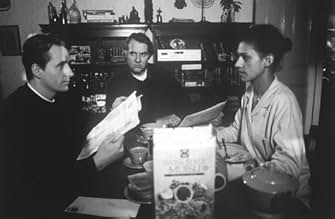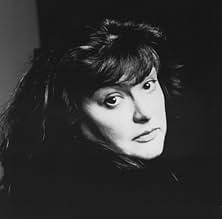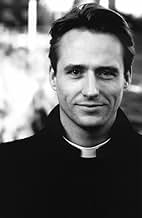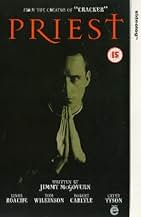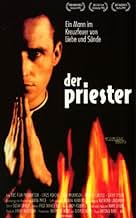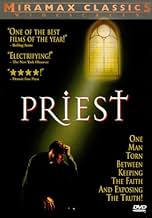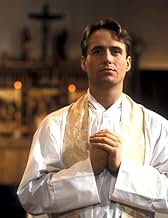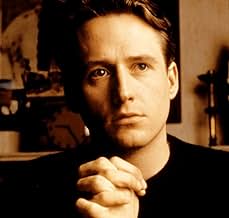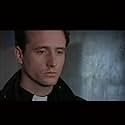NOTE IMDb
7,1/10
11 k
MA NOTE
Ajouter une intrigue dans votre langueA homosexual Catholic priest finds out during confessional that a young girl is being sexually abused by her father, and has to decide how to deal with both that secret and his own.A homosexual Catholic priest finds out during confessional that a young girl is being sexually abused by her father, and has to decide how to deal with both that secret and his own.A homosexual Catholic priest finds out during confessional that a young girl is being sexually abused by her father, and has to decide how to deal with both that secret and his own.
- Réalisation
- Scénario
- Casting principal
- Nomination aux 1 BAFTA Award
- 5 victoires et 3 nominations au total
Avis à la une
From the symbolic introductory scene of "Priest" wherein an old, weary-looking priest yanks a huge crucifix from the church altar, proceeds to carry it through the streets of his impoverished town as if he were Jesus himself, and proceed to bash through the door of his presbytery, you know you're in for something different - stimulating, controversial, thought-provoking. "Priest" is VERY MUCH that movie.
The old priest's clerical replacement comes in the form of Father Greg (Linus Roache, in a star-making role), a young, fair-haired, boyishly handsome visionary who, with typically youthful verve, strives to bring the Catholic Church directly to the people (well, to the Catholics, anyway), and receives his actions with decidedly mixed feelings. The older priest still in residence, Father Matthew (the excellent Tom Wilkinson), who has long settled into amiable apathy, inclines toward drink while maintaining a relatively clandestine relationship with his black, attractively careworn housekeeper (the underused Cathy Tyson). There is initial friction as the Old and New Worlds collide. Father Matthew dismisses Father Greg's modernistic sermons, while Father Greg frowns upon Father Matthew's casual stance on papal celibacy. Eventually, we learn Father Greg has his own difficulty with celibacy...but with other men.
As the story proceeds, we are drawn into the emotional and moral struggles of Father Greg as he wrestles not only with his own social and spiritual ethics, but those of his parish. In one particularly chilling confessional scene, a male member of the parish practically flaunts his sexual desires while "justifying" his incestuous advances toward his teenage daughter.
"Priest" is an important, ambitious project and yields emotional power in its depiction of moral adversity. But it's a mixed blessing. Some of the scenes come off overbaked and melodramatic, while the resolution of the piece should be more powerful and less compromising; instead it comes off manufactured and unrealistic, hurting its overall impact.
In fairness, "Priest" does bring out the hypocrisy in both priests, as well as the parish. Nobody comes off saintly here, just flawed and human. An interesting bi-note is that there have been no comments in the fact that the elder priest is having a sexual relationship with a BLACK housekeeper. Forty years ago, according to religious purists, the Bible interpreted ethnically mixed relationships and marriages as abominations as well. At least some headway HAS been made.
Is "Priest" anti-Catholic in its message? To an extent, yes. The Catholic's Church's unyielding, unprogressive, medieval doctrines are brought to task here, never more pointedly than in the scene where Father Greg, agonizing over whether to prevent the continued sexual abuse of the young girl and report the father to authorities, or respect the confidentiality of the confessional and remain silent, reluctantly chooses the latter.
While I deem this movie to be a stronger platform for social tolerance, `Priest' still drums home beautifully the message that organized religion is still used as a tool to govern instead of instill moral standards, particularly in other countries, and as a persecutive weapon against certain sectors of society that do not conform to those rigid standards. As a consequence, the Church has provided a comforting harbor and hazardous safety zone for certain "acceptable" bigotries.
We need more brave, topical films like "Priest" to confront such important social issues and display them front-and-center.
The old priest's clerical replacement comes in the form of Father Greg (Linus Roache, in a star-making role), a young, fair-haired, boyishly handsome visionary who, with typically youthful verve, strives to bring the Catholic Church directly to the people (well, to the Catholics, anyway), and receives his actions with decidedly mixed feelings. The older priest still in residence, Father Matthew (the excellent Tom Wilkinson), who has long settled into amiable apathy, inclines toward drink while maintaining a relatively clandestine relationship with his black, attractively careworn housekeeper (the underused Cathy Tyson). There is initial friction as the Old and New Worlds collide. Father Matthew dismisses Father Greg's modernistic sermons, while Father Greg frowns upon Father Matthew's casual stance on papal celibacy. Eventually, we learn Father Greg has his own difficulty with celibacy...but with other men.
As the story proceeds, we are drawn into the emotional and moral struggles of Father Greg as he wrestles not only with his own social and spiritual ethics, but those of his parish. In one particularly chilling confessional scene, a male member of the parish practically flaunts his sexual desires while "justifying" his incestuous advances toward his teenage daughter.
"Priest" is an important, ambitious project and yields emotional power in its depiction of moral adversity. But it's a mixed blessing. Some of the scenes come off overbaked and melodramatic, while the resolution of the piece should be more powerful and less compromising; instead it comes off manufactured and unrealistic, hurting its overall impact.
In fairness, "Priest" does bring out the hypocrisy in both priests, as well as the parish. Nobody comes off saintly here, just flawed and human. An interesting bi-note is that there have been no comments in the fact that the elder priest is having a sexual relationship with a BLACK housekeeper. Forty years ago, according to religious purists, the Bible interpreted ethnically mixed relationships and marriages as abominations as well. At least some headway HAS been made.
Is "Priest" anti-Catholic in its message? To an extent, yes. The Catholic's Church's unyielding, unprogressive, medieval doctrines are brought to task here, never more pointedly than in the scene where Father Greg, agonizing over whether to prevent the continued sexual abuse of the young girl and report the father to authorities, or respect the confidentiality of the confessional and remain silent, reluctantly chooses the latter.
While I deem this movie to be a stronger platform for social tolerance, `Priest' still drums home beautifully the message that organized religion is still used as a tool to govern instead of instill moral standards, particularly in other countries, and as a persecutive weapon against certain sectors of society that do not conform to those rigid standards. As a consequence, the Church has provided a comforting harbor and hazardous safety zone for certain "acceptable" bigotries.
We need more brave, topical films like "Priest" to confront such important social issues and display them front-and-center.
a challenge to viewer. because it is one of the films who seems present all in a too honest manner. because it seems have too many themes. because it seems not convince in real sense. in fact, it is a very simple story about vulnerability, faith and courage. about instinct, pray and sufferance. about Christ and wold. nothing new. but enough to be provocative. and this is the basic virtue of it. then, the performance of Linus Roache who gives to the father Greg beautiful nuances who saves the character out of clichés. story about people in delicate situations, about painful secrets and about the impact of truth, it is difficult to see "The Priest" if you are out of the theme. to define it as a film about homosexuality and incest is too easy and far to be enough. or correct. because it is a film about vocation and responsibility, weakness and the choices changing everything. and not the young priest or the young woman are the heroes but the others. and not exactly the others but theirs reactions. a film about vulnerability. one of the most impressive. and useful. maybe, for define yourself.
11 years after its release, I finally got around to watching one of 1994's most controversial films. I don't know what took me so long.
This is the story of Father Greg Pilkington, an idealistic young priest appalled by the liberal-thinking, older priest he shares a congregation with. Clashes and airs of superiority from Father Greg set up, almost calculatedly, his crushing and inevitable fall from grace. Try as he might, Father Greg, pious and as intolerant as ever, cannot suppress his sexuality and takes to the gay bar scene. A casual pick up turns into an affair which in turn becomes a personal and professional disaster as an equally intolerant society pushes him towards wrongful arrest and a verdict of "guilty." Father Greg becomes the object of derision and hatred by the bigoted, close minded community, itself a reflection of all the young priest exhibited in but a show of intolerance and sanctimoniousness.
The real heart of this picture occurs in the confessional when a desperate young girl tells of ongoing sexual abuse at the hands of her father. Eventually, this information becomes a test of faith for Father Greg as he questions his spirituality, the laws of the church and God himself.
During all of this the older priest, Father Matthew, preaches of "the trappings of power" that the Church has saddled itself with - and how the trappings have gotten in the way of the message of God, of love, of tolerance, of patience and compassion. As might be expected, the Church's higher ups have little patience for this sort of talk - and the congregation itself shuns Father Greg turning mass into an explosive show of blind eyed fanaticism.
As Father Greg, Linus Roche gives a searing, searching performance as the young tormented priest. His fall and redemption, the center of the story, comes across with an earnestness that steers clear of sensationalism, despite the loaded message of the movie. Tom Wilkinson, as ever, gives a performance that is as natural and believable - and likable - as anything he's done before or since. (Side note: having waited so long to watch this it's interesting to see these two actors with important roles in this year's new and glorious Batman Begins.) A truly remarkable and emotional film.
This is the story of Father Greg Pilkington, an idealistic young priest appalled by the liberal-thinking, older priest he shares a congregation with. Clashes and airs of superiority from Father Greg set up, almost calculatedly, his crushing and inevitable fall from grace. Try as he might, Father Greg, pious and as intolerant as ever, cannot suppress his sexuality and takes to the gay bar scene. A casual pick up turns into an affair which in turn becomes a personal and professional disaster as an equally intolerant society pushes him towards wrongful arrest and a verdict of "guilty." Father Greg becomes the object of derision and hatred by the bigoted, close minded community, itself a reflection of all the young priest exhibited in but a show of intolerance and sanctimoniousness.
The real heart of this picture occurs in the confessional when a desperate young girl tells of ongoing sexual abuse at the hands of her father. Eventually, this information becomes a test of faith for Father Greg as he questions his spirituality, the laws of the church and God himself.
During all of this the older priest, Father Matthew, preaches of "the trappings of power" that the Church has saddled itself with - and how the trappings have gotten in the way of the message of God, of love, of tolerance, of patience and compassion. As might be expected, the Church's higher ups have little patience for this sort of talk - and the congregation itself shuns Father Greg turning mass into an explosive show of blind eyed fanaticism.
As Father Greg, Linus Roche gives a searing, searching performance as the young tormented priest. His fall and redemption, the center of the story, comes across with an earnestness that steers clear of sensationalism, despite the loaded message of the movie. Tom Wilkinson, as ever, gives a performance that is as natural and believable - and likable - as anything he's done before or since. (Side note: having waited so long to watch this it's interesting to see these two actors with important roles in this year's new and glorious Batman Begins.) A truly remarkable and emotional film.
Priests are not often the heroes of movies:some famous predecessors were Robert Bresson's "journal d'un curé de campagne" (1945),Luis Bunuel's "Nazarin" (1958) and Jean-Pierre Melville 's "Leon Morin prêtre" (1961).But none of these directors went as far as Antonia Bird .Their movies were perhaps esthetically better,but nothing shocking for people who were brought up religiously ,nothing like the pictures of this priest lying on a bed with his lover.One will add that Bunuel's movie was looked upon as "very Christian" by the Spanish censorship when it was exactly the contrary.But it's difficult to consider Bird's work a fable:it's a realistic story,where sex occupies the center of the plot:sex between the other priest and the housekeeper,sex between the father and his daughter,sex between Rochman and Carlyle .Bird's style,though depicting the poor sides of Liverpool is very different from Kenneth Loach's .Her pictures are polished up ,like the one in confessional where the incest father is speaking through the grille ,or the two lovers on the beach.
Bird's movie is very interesting because it broaches the problem of celibacy in the catholic religion (protestant priests are allowed to marry aren't they),and,as the hero remarks "Jesus did not ask for chastity did he?"A hero who is not always very smart:"be discreet" he tells to his colleague who sleeps with the housekeeper,but he kisses his lover in a car in broad daylight.
The final battle in the church is particularly interesting,because it's a battle of words,repeating quotations from the Bible,and there are so many ways of interpreting its meanings .It seems that the priest uses the New testament ( judge not lest...,Mary Magdelene, forgive not seven times but seventy)whereas his enemy draws from the old one (a man sleeping with a man is an abomination).
The seal of the confessional subject is not that much new however:even in 1953,Hitchcock made "I confess" in which Montgomery Clift was confronted to the same problem.
Best line;the older priest ,telling a shocked congregation that God is probably too busy to care about what men do with their d.....
Bird's movie is very interesting because it broaches the problem of celibacy in the catholic religion (protestant priests are allowed to marry aren't they),and,as the hero remarks "Jesus did not ask for chastity did he?"A hero who is not always very smart:"be discreet" he tells to his colleague who sleeps with the housekeeper,but he kisses his lover in a car in broad daylight.
The final battle in the church is particularly interesting,because it's a battle of words,repeating quotations from the Bible,and there are so many ways of interpreting its meanings .It seems that the priest uses the New testament ( judge not lest...,Mary Magdelene, forgive not seven times but seventy)whereas his enemy draws from the old one (a man sleeping with a man is an abomination).
The seal of the confessional subject is not that much new however:even in 1953,Hitchcock made "I confess" in which Montgomery Clift was confronted to the same problem.
Best line;the older priest ,telling a shocked congregation that God is probably too busy to care about what men do with their d.....
Insightful movie. Makes you reflect a lot on the reality of those who embrace celibacy as priests. There are issues in today's world that affect priests and their commitment as ministers in the Church that this movie brings out very well. It might have been considered a very provocative movie when it came out, but it honestly reflects Church reality in some countries. It makes you realize the humanness of priests and the emotional, moral and spiritual problems they grapple with. I liked the ending the best - the only one in the Church capable of forgiving and accepting the gay priest, was the young girl who had been abused by her father and who had confided in the priest. Very touching and realistic.
Le saviez-vous
- AnecdotesThe Catholic Church in Ireland were very vocal about their views in having the film banned from theatrical distribution. The film censor disagreed and the film was released with an 18 certificate. This marked a major turning point in the relationship between the church and the Irish Film Censor board.
- GaffesFather Greg holds up a communion wafer which is smooth. The scene cuts to Graham and then back to Father Greg, and the wafer has a diagonal line across it.
- Citations
Father Greg Pilkington: [addressing Father Redstone in Latin] Abi et futue te ipsum, sordide senex.
[Translation: Go fuck yourself, you dirty old man]
- Versions alternativesThe US version has been cut by seven minutes.
- Bandes originalesGreen Green Grass of Home
Composed by Curly Putman
Performed by Tom Wilkinson
Copyright Tree International
by kind permission of Burlington Music Co. Ltd./Warner Chappell Music Ltd.
Meilleurs choix
Connectez-vous pour évaluer et suivre la liste de favoris afin de recevoir des recommandations personnalisées
- How long is Priest?Alimenté par Alexa
Détails
- Date de sortie
- Pays d’origine
- Site officiel
- Langues
- Aussi connu sous le nom de
- Actos privados
- Lieux de tournage
- Blundellsands, Merseyside, Angleterre, Royaume-Uni(beach scene with boy and coffee)
- Sociétés de production
- Voir plus de crédits d'entreprise sur IMDbPro
Box-office
- Montant brut aux États-Unis et au Canada
- 4 165 845 $US
- Week-end de sortie aux États-Unis et au Canada
- 113 430 $US
- 26 mars 1995
- Montant brut mondial
- 4 165 845 $US
- Durée1 heure 45 minutes
- Couleur
- Mixage
- Rapport de forme
- 1.66 : 1
Contribuer à cette page
Suggérer une modification ou ajouter du contenu manquant



